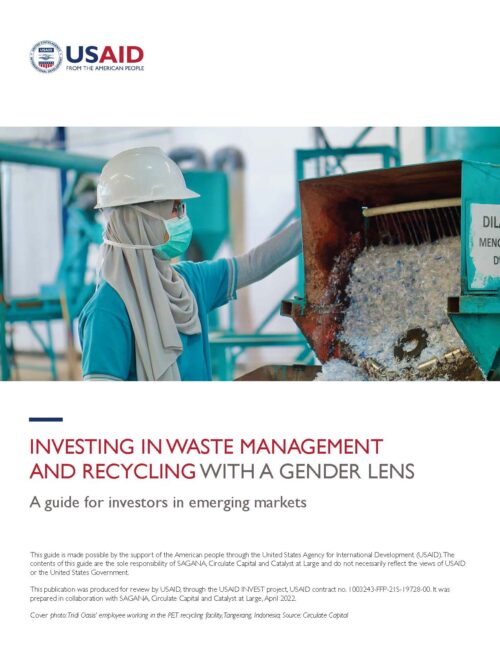Investing in Waste Management and Recycling with a Gender Lens


This guide offers a business case, framework, examples, case studies, and tools that can help commercial and impact investors in the waste management and recycling sector to integrate a gender lens in their activities. We assume our readership to be familiar with waste management and recycling, but do not assume any prior knowledge of gender lens investing. The guide focuses on emerging markets and draws on examples from the same markets. When talking about investments in waste management and recycling, this guide primarily refers to post-consumer materials from residential and commercial sources, as well as post-industrial waste.
Women play key roles in the sector, ranging from skilled entrepreneurs and employees, to consumers and waste collectors. Yet, investments in the sector tend to overlook the contributions that women make, and thus miss opportunities. As it stands today, women have less access to investment capital when compared to men1, women-owned businesses tend to have less visibility with investors, and women are less likely to occupy senior management roles in the sector. Growth and formalization of the sector often fail to take into account the significant role women play as consumers and supply chain workers, leaving existing power dynamics in place and a loss of business opportunities.
In section two, the guide provides a business case for making gender-smart investments in the sector. Our research found that gender-smart activities at the fund and portfolio level can unlock opportunities, such as reaching untapped markets. Investors can unlock value by expanding pipeline sources to include women-led companies, or companies focused on female-controlled waste streams. Further, gender-smart activities can increase market share and drive innovation, as companies that design their products and services for women will capture customer segments for whom targeted solutions are missing today.
Gender-smart investments can also enhance growth drivers such as traceability and supply chain sustainability, which are critical elements for waste management and recycling businesses in meeting evolving market preferences. Further, such investments can also mitigate risks such as the reputational damage that gender-blind investments can cause in a sector where investors can play a key role in solving the gender-based violence and discrimination that women are exposed to. Such investments can also improve livelihoods, which will lead to greater sustainability of the supply chain, given that in several emerging markets women play a majority role as waste collectors.
The guide highlights how gender-smart investments can play a role in meeting such business interests, and provides recommendations for funds and investment teams on how to act on them.
This publication was produced for review by USAID, through the USAID INVEST project, USAID contract no. 1003243-FFP-21S-19728-00. It was prepared in collaboration with SAGANA, Circulate Capital and Catalyst at Large, April 2022 and published online here.

